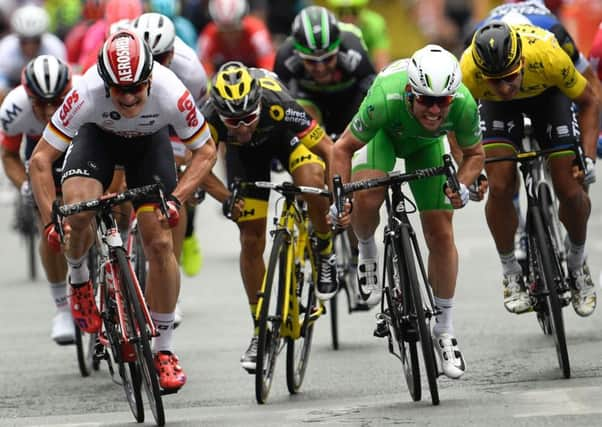Mark Cavendish makes history with 28th Tour stage win


Andre Greipel punched the air after the pair crossed the line in Angers, but the German’s arm soon dropped and Cavendish quietly pumped a fist before replays confirmed his victory – with the Tour’s official timekeepers putting the gap at six thousandths of a second.
Cavendish won stage one of the Tour on Saturday to wear the yellow jersey for the first time in his career, and this latest success gives the 31-year-old 28 Tour stage wins, moving him level with Bernard Hinault in second on the all-time list behind Eddy Merckx on 34.
Advertisement
Hide AdAdvertisement
Hide AdFive-time Tour winner Hinault was on hand to congratulate Cavendish in person on the podium.
“When I started my career, for me to at any point be mentioned in the same sentence as Eddy Merckx or Bernard Hinault is more than I could have dreamed of,” Cavendish said.
“There’s no way I could sit here and compare myself in any way to those two greats.”
Greipel and his fellow German Marcel Kittel have dominated sprints in the last three Tours, leading many to question whether Cavendish’s time had passed before this race began on Saturday.
Three stages in, that notion has already been dismissed.
The 31-year-old said his winter move to Team Dimension Data – the African-based squad which supports the Qhubeka charity – has given him an entire new purpose on a bike. “It’s given me a new lease of life,” he said. “It’s given me a cause to ride for rather than just pressure to win.
“I’m very fortunate to have ridden for the biggest teams in cycling. They were successful years, I had a lot of fun and made a lot of friends. But with the biggest teams and the biggest funds comes a lot of pressure to win.
“Now it’s something more than just winning, more than being a moving billboard. We ride for Qhubeka. It’s about getting 5,000 kids on bikes in Africa. It’s close to every rider’s heart. It could be a spiel but it’s not, it’s 50 per cent of what we do with results the other 50 per cent.”
Whatever the inspiration, there can be no questioning the results. On Saturday, Cavendish had to come around Peter Sagan to win while leaving Kittel in his wake, and here he was a full bike length behind Greipel as they barrelled into the last 50 metres.
Advertisement
Hide AdAdvertisement
Hide Ad“It was touch and go if I’d pass him,” Cavendish said of his rival from Lotto-Soudal. “I didn’t get him with the sprint, I got him with the lunge to the line so I was pretty fortunate with that.”
Brian Coquard of FDJ was third, while world champion Sagan came home fourth to retain the yellow jersey he took off Cavendish on Sunday.
With Sagan in yellow and his Tinkoff team controlling the peloton, they kept the pace slow to aid their leader Alberto Contador, injured in a crash on the first stage, and the long 223.5km run from Granville – passing through Fougeres where Cavendish took his only win in last year’s Tour – took just a shade under six hours for the peloton to complete.
“It was nice,” Sagan joked about the leisurely pace. “I was thinking at one moment we would stop for coffee like old times.”
The 24-year-old Briton Dan McLay, riding for Fortuneo Vital-Concept, was ninth yesterday – his second top-ten finish.
Chris Froome finished near the front of the pack, 22nd on the day, moving the Team Sky man up to fourth overall, still 14 seconds off yellow.
The presence of the general classification riders near the front on sprint days has been the cause of increasing debate in the peloton. While not interested in contesting the sprint, teams with overall contenders are desperate to avoid time losses caused by getting caught behind crashes, but the battle for real estate can cause those crashes in itself.
In his press conference, Sagan called on cycling’s governing body the UCI to change the rules which currently see general classification times neutralised if there is a crash inside the final three kilometres of a stage.
“We want to ride with sprinters for the sprints,” he said. “We don’t want to fight also with the GC guys. It is very dangerous.”